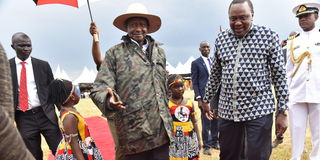How Kenya-Uganda peace deal helped conflict-prone Karamoja region thrive

Kenya's President Uhuru Kenyatta and Ugandan counterpart Yoweri Mseveni arrive at Naitawae ground in Moroto district, Uganda on September 12,2019. The signed a memorandum of understanding for sustainable peace between the West Pokot, Turkana and Karamojong communities.
The Karamoja region, shared by members of Kenya's Turkana community and their Karamojong counterparts in Uganda, is experiencing rapid economic transformation following a memorandum of understanding on cross-border peace and development entered into between Kenya and Uganda last year.
The region, which has for many years suffered a series of cattle raids, is experiencing relative peace which has boosted cross-border trade as warriors behind armed conflicts surrender their guns and invest in businesses.
“The prevailing peace has boosted cross-trade between the two countries through the Moroto-Lokiriama border and transformed livelihoods of our pastoralists,” said Mr Pius Ewaton, the Kenya National Chambers of Commerce and Industry Turkana chapter boss.
Security teams from the two countries have been holding joint meeting to crack down on criminals out to disrupt the peace by attacking the traders and stealing animals. The Ugandan administration has in the past 10 years recovered over 40,000 guns in a disarmament operation aimed at boosting peace and trade in Karamoja region.
“We have not encountered any act of lawlessness in this border region for a long period as a result of the peace accord signed by elders from the two countries,” said Mr Mark Ajon Lokwawi, Lokiriama assistant chief.
He said a clause in the peace agreement empowers the local administrators to punish law breakers.
“Elders play a crucial role in enforcement of communal laws. They are highly respected in solving disputes and promoting peaceful co-existence among pastoralists in the two countries,” Mr Lokwawi said.
President Uhuru Kenyatta and his Ugandan counterpart Yoweri Museveni met in Moroto town within the Karamoja region on September 12 last year to witness the signing of a memorandum of understanding on peace and development between the two countries.
The treaty is meant to boost harmonious relations between the Karamoja from Uganda and their Turkana and Pokot pastoralist communities from Kenya who have, for many years, suffered cross border conflicts caused by cattle raids.

Kotido Jie group from Uganda perform at Naitawae ground in Moroto district during the signing of a memorandum of understanding for sustainable peace between the West Pokot, Turkana and Karamojong communities.
The treaty is supported by the United Nations Development Programme and is aimed at enhancing development undertakings in the region.
"The MoU cemented peaceful co-existence," said Mr Chris Ekitela, a trader who operates between Lodwar, Lokiriama and Moroto markets.
He said fresh produce traders in Lodwar are sourcing their commodities from Moroto in Uganda which they consider to be much closer compared to the traditional Kitale source in Trans-Nzoia county.
“Lodwar is only 144km from Moroto compared to 297km from Kitale,” Mr Ekitela said.
He deals in supplies of cereals and fresh farm produce that includes cabbages, watermelon, bananas, sugarcane maize and beans.
He said products like beer, soda, fresh milk and mineral water are in high demand in the common market.
The traders, however, decry the pathetic state of the road linking Lodwar to Moroto which is a major impediment to cross-border trade.
He said that during the recent destructive floods, transport activities were disrupted after several dry river beds were flooded.
"We also need bridges along the dry river beds to ensure continuity in transportation of goods to the market during the rainy season," Ekwam Ekiru, another trader from Lodwar, said.
The traders cited lack of a one border post as contributing to high cost of doing business.
"We also want non-tariff barriers that restrict import or export of goods along the border reviewed to promote cross-border trade," Mr Ekiru said.
Turkana County Senior Adviser for Security, Peace and Borderlands Initiative Augustine Lokwang said that trade was boosting interaction between border pastoralist communities, translating to peace.
"Reduced cases of banditry attacks have also been attributed to commitment of leaders from both communities to the Lokiriama Peace Accord which was reached 45 years ago," Mr Lokwang said.
He said the MoU by the two Heads of State also appreciates the need to establish infrastructure to encourage permanent settlement of communities that have been migrating in search of water.
"For Turkana county, The Kenya-Uganda Memorandum of Understanding for Cross-Border Peace and Socio-Economic Development is expected to be relied on to improve water infrastructure. High impact multi-purpose mega dams will be established to support livestock, agriculture and fishing," he said.
Mr Lokwang said the main objective of the MoU was to achieve relative peace through programmes that will enhance market access, livestock trade and value chain improvement to benefit pastoralists.
He called for joint human and livestock disease detection, treatment, vaccination and management under ''One Health Programme''.






